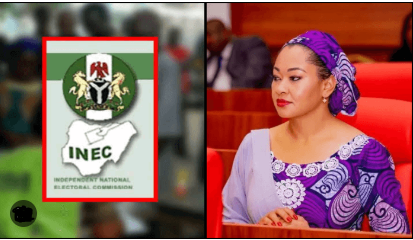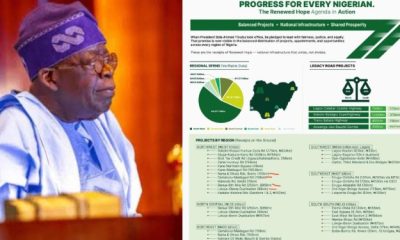The Independent National Electoral Commission (INEC) announced on Tuesday that the petition submitted for the recall of suspended Kogi Central Senator, Natasha Akpoti-Uduaghan, lacks critical information needed to initiate the recall process.
In a statement released by INEC’s spokesperson, Sam Olumekun, the commission noted that the petitioners had failed to provide key contact details such as addresses, telephone numbers, and email addresses for the voters who supposedly signed the petition.
Without this information, INEC is unable to contact the signatories to verify their support.
This observation was made during INEC’s weekly meeting on Tuesday, where the recall process for Akpoti-Uduaghan was discussed.
Recall Petition Submitted by Concerned Kogi Youth and Women
The petition for Akpoti-Uduaghan’s recall was submitted by a group known as Concerned Kogi Youth and Women, who lodged their request at INEC’s headquarters in Abuja.
The group accused the senator of losing their confidence in her representation and requested that the commission initiate the recall process.
In their letter to INEC, the group referred to a Court of Appeal decision on October 31, 2023, which affirmed Akpoti-Uduaghan’s election as the senator for Kogi Central after a legal dispute over the February 25, 2023, Kogi Central Senatorial election.
INEC Clarifies Recall Process Requirements
INEC explained that, in line with the 1999 Constitution, the Electoral Act 2022, and its 2024 Regulations and Guidelines for Recall, the petition needs to comply with specific legal procedures.
The commission highlighted that the petition, which was accompanied by six bags of documents claiming to contain signatures from over half of the 474,554 registered voters across Kogi Central’s 902 polling units, was missing the required contact details.
“The Commission’s immediate observation is that the representatives of the petitioners did not provide their contact address, telephone number(s), and email address(es), which are necessary for communication as specified in our regulations,” the statement read.
INEC also reminded the public that the decision to recall a legislator is solely the prerogative of the registered voters in the constituency who can indicate a loss of confidence in their representative.
Next Steps for Petitioners
INEC assured the public that once the petition meets the legal criteria, the commission would begin verifying the signatures through the Bimodal Voter Accreditation System (BVAS) in an open process at each polling unit. Both the petitioners and the elected official under recall, as well as accredited observers, will be allowed to observe this process.
If the petitioners correct the missing details, INEC will proceed to announce the next steps according to the law.
Legal Framework for Recall
Under Section 69 of the Nigerian Constitution, a senator can be recalled if a petition, signed by more than half of the registered voters in their constituency, is presented to INEC.
The petition is then subject to a referendum, which must be approved by a majority vote of the constituency’s registered voters.
ALSO READ : INEC reviews recall petition against Senator Natasha, cites procedural gaps
Background on Akpoti-Uduaghan’s Suspension
On March 6, 2025, the Senate suspended Akpoti-Uduaghan for six months following allegations of misconduct during a plenary session.
She was accused of disregarding Senate rules and was penalized with the withdrawal of her security details, suspension of her salary, and closure of her office.
The Senate indicated that the suspension could be lifted if she submits a formal apology.
Akpoti-Uduaghan, however, has suggested that her suspension is retaliation for accusing Senate President Godswill Akpabio of sexual harassment, a claim which Akpabio has denied.
Challenges in Past Recall Attempts
Historically, recalling legislators in Nigeria has proven to be a difficult task. Since the return of democracy in 1999, there has not been a single successful recall of a federal legislator.
Several attempts, including those against Senators Ali Ndume (Borno South) and Dino Melaye (Kogi West), have failed due to various challenges such as low turnout during signature verifications or resistance from political loyalists.
INEC’s statement emphasizes that the recall process, like all electoral processes, will be conducted in strict adherence to the legal framework, and the public should disregard any social media speculations about the process.


 Entertainment1 week ago
Entertainment1 week ago
 Entertainment5 days ago
Entertainment5 days ago
 Comments and Issues1 week ago
Comments and Issues1 week ago
 Comments and Issues1 week ago
Comments and Issues1 week ago
 Business1 week ago
Business1 week ago
 Health6 days ago
Health6 days ago
 Comments and Issues1 week ago
Comments and Issues1 week ago
 Health3 days ago
Health3 days ago












